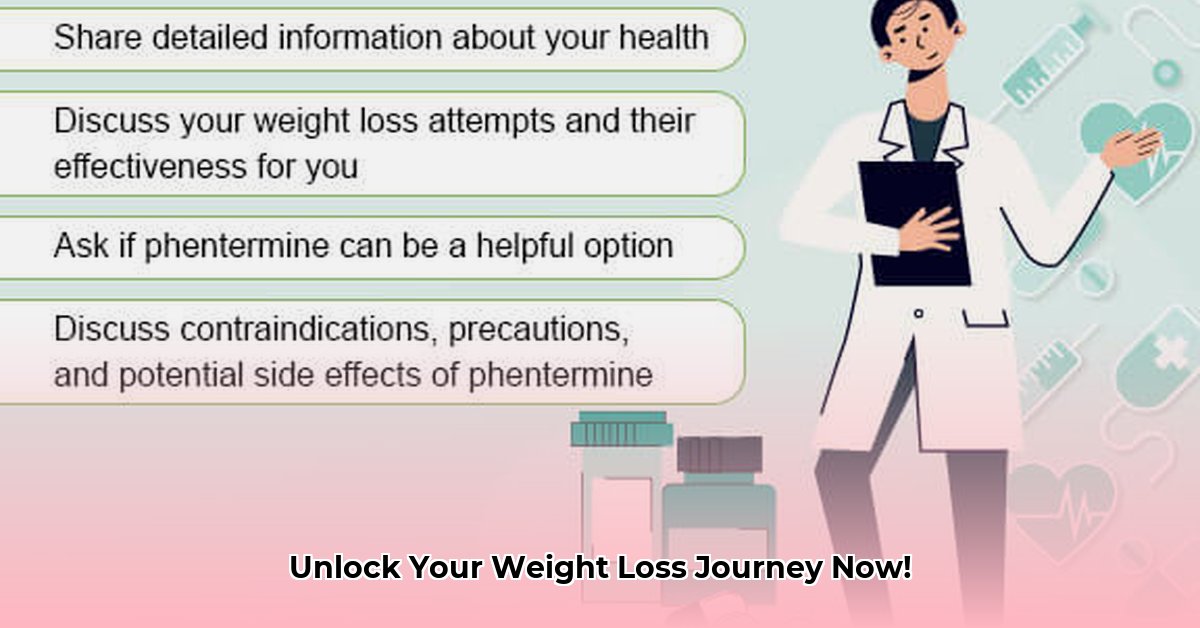
Losing weight can be a challenging journey, but understanding your options and finding the right support can make all the difference. This guide explores using phentermine within a structured weight loss clinic program. Remember, this information is for educational purposes only and does not constitute medical advice. Always consult your doctor before starting any weight loss program or medication.
Understanding Phentermine and Its Role in Weight Loss
Phentermine is a prescription medication used to aid in weight loss. It primarily works by suppressing appetite, making it easier to consume fewer calories. Think of it as a tool to assist, not replace, healthy habits. It interacts with neurotransmitters in your brain to reduce hunger signals. However, phentermine's effectiveness is significantly enhanced when combined with a healthy diet and regular exercise. It’s crucial to remember it's not a stand-alone solution.
The Weight Loss Clinic Approach: A Step-by-Step Guide
A successful weight loss journey using phentermine often involves a multi-faceted approach at a dedicated clinic. Here's a typical framework:
1. Initial Consultation & Assessment: This involves a thorough health evaluation including a physical exam, blood work, and discussions about your medical history, lifestyle, and weight loss goals. This initial assessment helps your doctor determine your suitability for phentermine and design a safe, personalized plan.
2. Personalized Treatment Plan: Your doctor will develop a tailored plan based on your individual needs. This plan typically integrates phentermine with other strategies such as:
- Dietary Modifications: Working with a registered dietitian, you'll create a balanced, healthy eating plan focusing on portion control and nutrient-rich foods.
- Exercise Program: A certified fitness professional will help create an exercise routine appropriate for your fitness level. This may include cardio, strength training, or other activities you enjoy.
- Behavioral Counseling: Some clinics offer counseling to address emotional or psychological aspects that may contribute to weight gain.
3. Ongoing Monitoring & Support: Regular check-ups with your doctor are essential to monitor your progress, adjust medication as needed, and address any concerns or side effects. The clinic may also offer support groups or educational resources to help you stay motivated.
Practical Guidance for Long-Term Weight Management
Successfully losing weight and keeping it off requires sustainable changes. Here's how to maximize your success:
1. Nutrition: Focus on a balanced diet rich in fruits, vegetables, lean proteins, and whole grains. Limit processed foods, sugary drinks, and excessive unhealthy fats. Portion control and mindful eating are crucial.
2. Exercise: Aim for at least 150 minutes of moderate-intensity aerobic exercise per week, spread throughout the week. Incorporate strength training exercises at least twice a week. Find activities you enjoy to increase adherence.
3. Lifestyle Changes: Prioritize adequate sleep (7-9 hours), manage stress effectively (through techniques like meditation or yoga), and build a strong support system. These lifestyle elements are as important as diet and exercise.
Potential Risks and Side Effects of Phentermine
Like any medication, phentermine carries potential side effects. Common ones include increased heart rate, insomnia, dry mouth, and constipation. More serious side effects are rare but possible. Open communication with your doctor is crucial to address any concerns promptly. It's important to understand that phentermine is not intended for long-term use.
Finding a Reputable Weight Loss Clinic
Choosing the right clinic is essential. Look for clinics with experienced medical professionals, comprehensive programs, and a focus on patient support. Research clinics in your area, read reviews, and compare their offerings before making a decision. Ensure the clinic's approach aligns with your health goals and preferences.
Conclusion: A Partnership for Success
A successful weight loss journey often requires a partnership between you and the medical team at a weight loss clinic. Understanding phentermine's role, adopting healthy lifestyle habits, and maintaining open communication with your doctor are key to achieving and sustaining your weight loss goals. Remember to always consult with your healthcare provider before starting any weight loss program or medication.